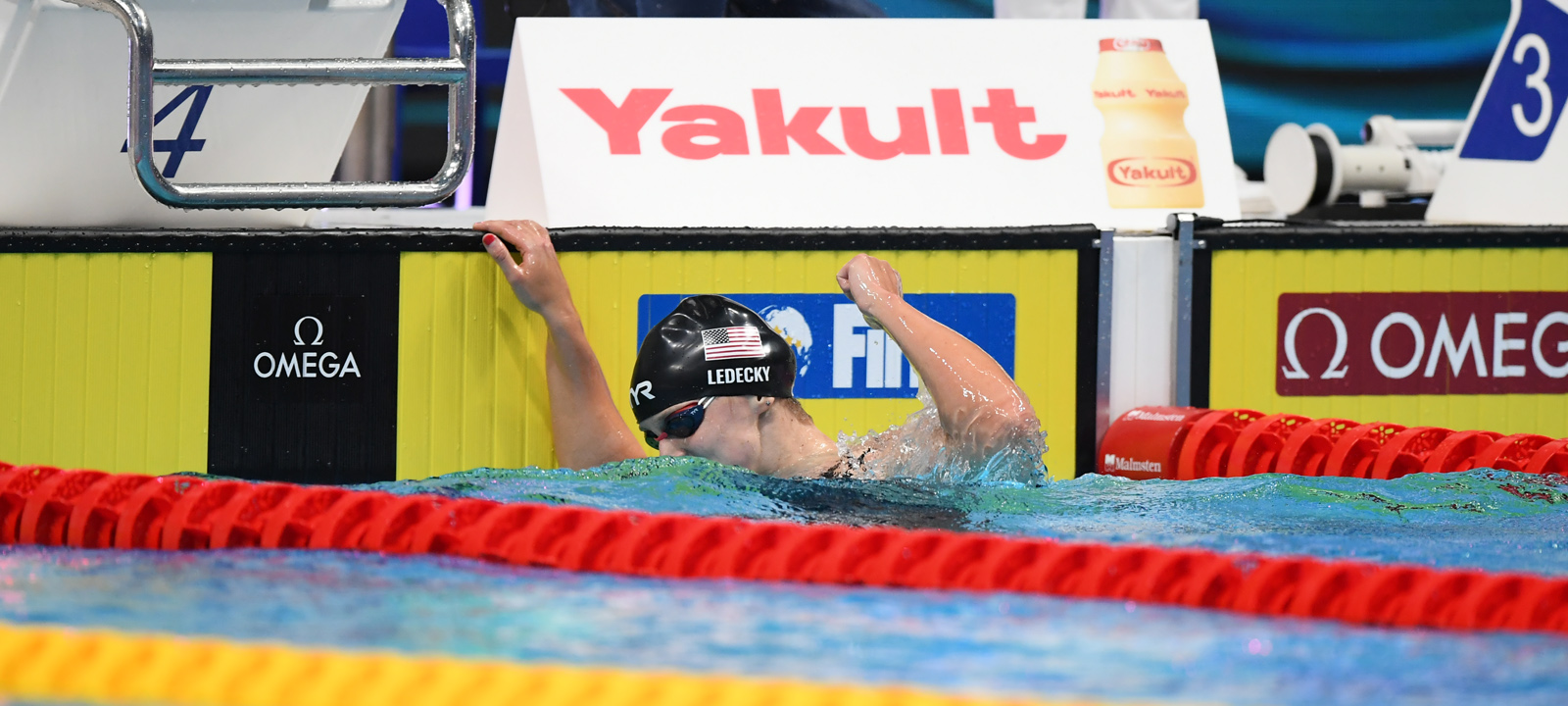
2022 FINA WORLD AQUATICS CHAMPIONSHIPS
Throughout the last week, we got to witness some incredible racing occur at the 2022 FINA World Championships. In this post, we wanted to highlight the accomplishments of the meet’s top female swimmers by ranking who we thought were the top 15 women of the World Championships. And while these rankings are weighted mainly towards a swimmer’s individual performances, other factors such as relay contributions and times are also considered.
It was difficult to pick out just 15 of the best women, as there were so many women who had incredible showings at worlds and we couldn’t fit them all in one list. These rankings are entirely subjective, and if you disagree with any of them, feel free to start discourse in our comments in a civilized manner.
So without further ado, let’s get started.
Honorable Mentions:
- Claire Curzan: The 17-year-old had one of the heaviest schedules out of anyone at this meet. Including prelims, semifinals, finals, and relays, she had sixteen swims in one week, and she still handled all of them like a pro. She did well in her individual events, making the finals of the 50/100fly, 100 free, and 100 back and earning a bronze in the 100 back, but where she really excelled was on the U.S. relays. Despite having so many individual races, she still was able to anchor four relay sin 52-point splits to help the U.S. win two relay golds and two relay bronzes. Without veteran freestylers like Simone Manuel and Abbey Weitzeil, Curzan was able to consistently step up time and time again for her country even with the load she had to take on this meet.
- Penny Oleksiak: Oleksiak lost one of her shots at an individual medal when she was DQed in the semifinals of the 200 free, and then she just missed the podium in the 100 free by finishing fourth. However, similar to Curzan, she was a key component of her country’s relays, with her efforts helping Canada win two silvers and two bronzes Her 52.51 split in the women’s 4×100 free relay was the fastest rolling split in the field, and allowed for Canada to overtake the U.S. for silver. Similar, in the mixed free relay, she anchored in 52.11 (the second-fastest female split of the field) to run down the Americans to take silver once more.
15. Lilly King (USA)
courtesy of Fabio Cetti
Before the meet started, Lilly King was a heavy favorite to win the 100 breast, and a likely medal contender in the 50 and 200 breast. However, she began to look off in her pet event when she nearly missed the final of the 100 breast and only advanced because her teammate Annie Lazor got DQed.
The next day, King uncharacteristically missed the podium in the event, finishing fourth. We then found out that King had been struggling with the after-effects of COVID-19, and according to her coach Ray Looze, she was racing at only 80% of her true capability.
But King got better and better as the meet went on, which showed when she won the 200 breast, coming home in 36.36 to chase down the field on the final lap. Two days later, she split 1:05.89 in the finals of the women’s medley relay (which was the fastest in the field) to assist Team USA in claim inggold. Because she continued to persevere and win individual gold even after facing COVID and failing to medal in her best event, she earned herself a spot on our list.
14. Zhang Yufei (CHN)
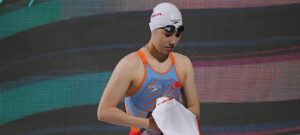
courtesy of Fabio Cetti
Like King, Zhang Yufei came into this meet as a favorite to win multiple events: and in her case, it was the 100 fly and 200 fly. We later learned that her home city of Shanghai had been seriously impacted by COVID-19 restrictions, and her participation at Worlds was in jeopardy up until a few weeks prior to the start of the meet. In addition, Chinese swimmers didn’t even have a trials meet due to the pandemic, and a team had to be selected based on “internal tests”.
All of these factors likely played a part in Zhang being well off her best times, and yet she still managed to medal in all three butterfly events. She took bronze in the 50 fly, 100 fly, and 200 fly, and even broke the Chinese record in the 50 fly with a time of 25.32. In addition, she also was the only woman aside Summer McIntosh and Katie Ledecky to win three individual medals.
13. Yang Junxuan (CHN)
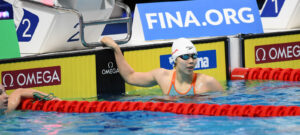
courtesy of Fabio Cetti
Yang Junxuan was a silver lining on a Chinese women’s team that overall was very off this meet, which can be proven by the fact that other stars such as Li Bingjie and Zhang Yufei were all well off their best times. Yang won China’s only gold of the meet in the 200 free individually, but her contributions to her country’s relays shouldn’t be overlooked either.
She was the only 52-point split on China’s women’s 4×100 free relay, going 52.79 to bring them from seventh to fourth place. Similarly, on the women’s 4×200 relay (which she scratched the 100 free semifinals to focus on), she came home in 1:54.18—the second-fastest rolling split from that race behind Katie Ledecky‘s 1:53.67.
12. Katie Grimes (USA)
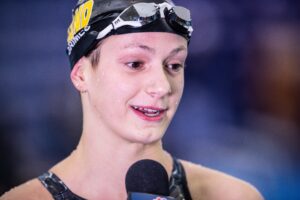
Katie Grimes (photo: Jack Spitser)
16-year-old Katie Grimes proved that her Tokyo Olympic appearance last year wasn’t a fluke when she took silver in the 1500 free (15:44.89) and 400 IM (4:32.89) at this World Championships meet. Her improvement trajectory was ginormous, having dropped nearly six seconds off her best time in the 1500 free and four seconds in the 400 IM. In addition, her 400 IM time was just 0.63 seconds behind that of winner Summer McIntosh.
At such a young age, Grimes is proving to be extremely versatile and successful in multiple events—also shown by the fact that she’s going to be competing in the 10k open water later this meet following her pool races. If she continues to improve in the coming years, don’t be surprised to see her ranked much higher on our future lists.
11. Rūta Meilutytė (LIT)
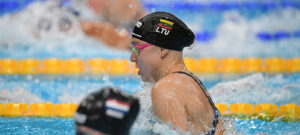
courtesy of Fabio Cetti
Not many swimmers are able retire for three years and come back as a World Champion, but Rūta Meilutytė is.
Meilutytė started off her meet by capturing bronze in the 100 breast in a time of 1:06.02. And while the event had the slowest winning time since 2005, it was her best time since coming out of retirement. But she wasn’t done with just bronze. On the final day of the competition, she won the 50 breast in a time of 29.70, which is just 0.27 seconds off her best time of 29.42 that was set all the way back when she was a 16 year old.
Having battled through depression and a two-year ban due to missing doping tests in retirement, the fact that Meilutytė was able to take two medals (with one being gold) in her first major international meet since 2018 is incredible.
10. Benedetta Pilato (ITA)
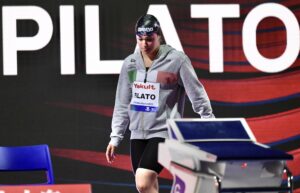
Photo: Fabio Cetti
After being DQed in the prelims at the Olympics last year in the 100 breast, Benedetta Pilato didn’t have a chance to prove herself at the world’s biggest competition stage. She redeemed herself to take gold in the event this year, swimming a time of 1:05.93. She later followed up that win with a silver medal in the 50 breast, the event that she broke the world record in last year, where she swam a 29.80 to finish just 0.1 seconds behind Melilutyte.
At just 17 years old, Pilatto follows the footsteps of Arianna Castiglioni and Nicolo Martinenghi in becoming Italy’s next breaststroke talent. And while she did not hit any of her best times in either event, she was one of the first to get her hand on the wall, and in the finals that’s what matters the most. Her medals in both the 50 and 100 breast are stepping stone for her to continue her success in the future.
9. Regan Smith (USA)

Photo Fabio Cetti
In the semifinals of the 100 back, Regan Smith scared the world record by clocking a time of 57.65, which was the fifth-fastest performance of all-time and just 0.2 seconds off Kaylee McKeown‘s mark of 57.45. In addition, it was one the closest that Smith has been to her best time of 57.57 in an individual 100 back since 2019. She was a bit slower in the finals, going 58.22, but it was still fast enough for her to win her first-ever World Championship title in the event. She then missed the podium by 0.47 seconds in the 200 fly and finished fifth in the 50 back.
Smith concluded her meet with a 58.40 backstroker leadoff leg in the women’s 4×100 medley relay, which helped Team USA secure gold in the event.
8. Kylie Masse (CAN)
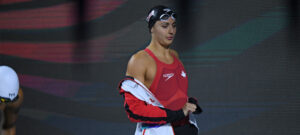
courtesy of Fabio Cetti
Kylie Masse is one of the most consistent swimmers in the world. At this World Championships, she continued her six-year streak of finishing no worse than second in the 100 back at major international meets, taking silver to Regan Smith in a season-best time of 58.40. She then followed up her silver with a win in the 50 back, swimming a 27.31. With her 50 back victory, she now has a Worlds medal in the 50, 100, and 200 backstroke distances.
On the last day of the meet, Masse beat out her individual 100 back time, leading off Canada’s bronze-medal winning women’s medley relay in 58.39 and recording the fastest backstroke time in the field. And while she didn’t podium in the 200 back this time around, her performances at this meet in the 50/100 back displayed her longevity in the sport.
7. Alex Walsh (USA)
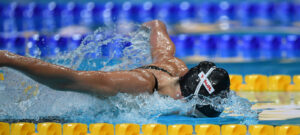
Courtesy of Fabio Cetti
Critics could say that Alex Walsh shouldn’t be ranked this high because she only swam one individual event. However, her swim in that said event also just happened to be one of the most incredible swims on the women’s side of the meet.
Walsh clocked a time of 2:07.13 in the 200 IM, beating her competition by 1.44 seconds and becoming the fifth-fastest performer of all time (and the third-fastest in a textile suit). In an event that has remained stagnant behind Katinka Hosszu for the last few years, the fact that Walsh swam the fastest non-Hosszu 200 IM time since Siobhan Marie O’Connor’s 2:06.88 in 2016 is something of significance.
To add on, in a relatively slow meet compared to previous years, Walsh’s time was one out of the just four women’s individual gold-medal winning times that were faster than the time it took to win Olympic gold in those respective events.
6. Kaylee McKeown (AUS)
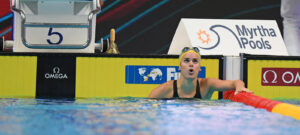
courtesy of Fabio Cetti
Kaylee McKeown‘s meet started with controversy as she scratched the 100 back, the event she holds the world record in, to focus on the 200 IM. Still, she got a silver medal in the event, swimming a time of 2:08.57 that was just 0.05 seconds off the time it took to win Olympic gold last year.
She had a few mishaps after that such as missing the podium in the 50 back, but McKeown finished off her meet strong with a World Championship title in the 200 back. In that race, she had an incredible last 50 to take over Phoebe Bacon for the gold.
Along with her individual success, McKeown also led off Australia’s mixed and women’s 4×100 medley relays, which both ended up taking silver. Although she didn’t hit any of her best times at this meet, she was still one of the few individual champions who won medals in other events and put up competitive times in every race she swam.
5. Mollie O’Callaghan (AUS)
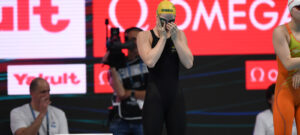
Photo Fabio Cetti
In her senior individual international debut, Mollie O’Callaghan took gold in the 100 free and silver in the 200 free. And while she didn’t set season-best times in either events, she helped Australia tie East Germany as the country with the most women’s 100 free world titles when she won her country’s fifth 100 free gold.
Something else worth noting was that O’Callaghan’s back-half split of 26.43 in the 100 free semifinals was the fastest last 50 ever swum by a woman in the 100 free, making her a racer like no other.
But what O’Callaghan really stood out for was how incredible she was on Australia’s relays. She helped her country win two golds and two silvers, and had the fastest split relative to her competition in the women’s and mixed 4×100 free relay, as well as the women’s 4×100 medley relay. Her most notable relay performance came when anchoring the mixed free relay, where she had a scorching-fast 52.03 split to hold off the U.S. and Canada and secure Australia a win in world record fashion.
4. Torri Huske (USA)
Like Curzan, Torri Huske also had a jam-packed sixteen-event schedule at this meet. Still, she ran away with three best times, two individual medals, and two national records. First, she broke her own American record en route to taking gold in the 100 fly, swimming a time of 55.64 that was just 0.16 seconds off the world record. She also clocked an American record time of 24.38 in the 50 fly semifinals, and finished fourth in the finals. In the 100 free, she earned bronze with her mark of 52.92, becoming the third-fastest U.S. woman of all time in the event and just the fourth U.S. woman under the 53-second barrier.

courtesy of Fabio Cetti
After the loss of Simone Manuel and Abbey Weitzeil, there were several questions surrounding who would be America’s best sprinter in their absence. In fact, many didn’t know how long it would be until the U.S. got another sub-53 100 freestyler. But Huske ensured her country didn’t have to wait long, as now America has both a butterflier who’s capable of nearing world record times and a freestyler who can go 52-point all in one.
In addition, Huske also swam in the finals of four relays, helping the Americans take two golds and two bronzes. Her six total medals ties Mollie O’Callaghan as the swimmer with the most medals from this meet.
3. Sarah Sjostrom (SWE)

courtesy of Fabio Cetti
A seasoned veteran of the sport, Sarah Sjostrom has been winning World Championship titles since 2009. 13 years since her first medal, the Swede added three more to her resume when she took silver in the 100 free and gold in both the 50 free and 50 fly. In addition, her time of 24.95 in the 50 fly was faster than any other woman has been in the event. As one out of the three women who took home multiple individual titles at this meet, she deserves to be near the top of our list.
Sjostrom didn’t swim on many relays, as Sweden only entered in one women’s relay, the 4×100 medley relay. In that relay, she anchored in a time of 52.66 (the third-fastest freestyle split of the field) to help her team finish fourth.
With 19 individual World Championship medals, Sjostrom is just one medal shy of tying Michael Phelps as the swimmer with the most individual medals in World Championship history.
2. Summer McIntosh (CAN)

courtesy of Fabio Cetti
When Summer McIntosh finished fourth in the 400 free at last year’s Olympics, she was labeled as the “future” of swimming.
But after two golds, a silver, and a bronze medal later at the 2022 World Championships, McIntosh proved that she was the “now”. She won both the 200 fly (2:05.20) and 400 IM (4:32.04) in world junior record times (her 4:29.12 in the 400 IM was not ratified by FINA as an official record), and became just the fourth woman under the four minute barrier in the 400 free when she took silver in a time of 3:59.39—a monumental accomplishment for someone that young. Although she didn’t swim the 200 free, her time of 1:54.79 leading off Canada’s bronze-winning 4×200 free relay was both a World Junior Record and faster than the time it took to win the individual 200 free.
At just 15 years old, McIntosh is already beating out some of swimming’s biggest names for gold. The sky is the limit for this Canadian teenager, and expect her to be at the top of many of our future lists.
1. Katie Ledecky (USA)
While choosing the top swimmer of a meet can sometimes be difficult, the decision to put Katie Ledecky at #1 this year was a no-brainer. Her resume speaks for itself. She took home three individual golds (she was the only swimmer, male or female, to win over two individual titles), winning the 400 free in championship record fashion (3:58.15), swimming the sixth-fastest time ever in the 1500 free (15:30.15), and the fifth-fastest time ever in the 800 free (8:08.04). In addition, her times in the 800 and 1500 free were the fastest she’s been in several years (and quicker than her Olympic gold winning times in each event).
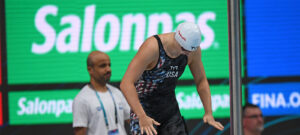
courtesy of Fabio Cetti
Ledecky also played a big role on the women’s 4×200 free relay, where she split a time of 1:53.67 that ranks as the third-fastest relay split of all time. Her leg in that race brought the United States from third place to first place position, and was a crucial reason why they were able to secure gold. Keep in mind, the Americans weren’t even expected to medal in this relay prior to the start of the meet. Her performance and leadership as a veteran was a driving force towards her team’s performance, which resulted in a win in championship record time.
Alongside the times she swam, Ledecky also etched her way into swimming’s history books this meet. Her 22 world medals now makes her the most decorated female swimmer in World Championship history, and her 14 individual titles is just one away from tying Michael Phelps as the swimmer with the most individual World Championship titles.
